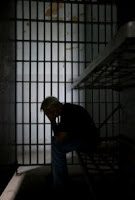Oct 6-7, 2008, Sonoma, CA
The Centerforce mission is to support, educate, and advocate for individuals, families, and communities impacted by incarceration.
HIGHLIGHTS
Matthew Cate, Sec. CDCR (CA Dept Corrections & Rehabilitation
- 50% of those exiting prison have no knowledge of where spending their first night.
- Overcrowding, and lack of resources will worsen due to fiscal crisis.
- "Lifers" have proved invaluable in calming the angry "25 year old

 Ann Adalist Estrin (National Resource Center on Children & Families)
Ann Adalist Estrin (National Resource Center on Children & Families)- The pain from incarceration remains for a lifetime. (Need for support groups)
- Children (in silence) mourn for their dad. ("Toxic stress"). Both need to feel "held in mind"
- Public Awareness Campaigns exist to expose the "broken" criminal justice system and a call for a response
- Bus from major cities in CA to the two largest women prisons in America. Leaves from LA at 4am and returns the next day at 9pm. Supplies food, housing, family photos, teddy bears, and counseling. Links the families together
Mike Farrell, Dan Abrahamson, Elizabeth Gaynes – Sentencing reform
- Paroles are essentially unavailable despite eligibility and warden approval. Sentencing from 5 to life, 10 to life, etc will never get out.
- More and more prisoners are being transferred out-of-State, guaranteeing family disintergration
-
85% of the married will be divorced at time of release. (98% of the incarcerated women)
- Best judges for what's needed are the "clients" themselves. Too often bureaucrats make the decisions
- Jobs first, housing second, and diversionary programs a distant third
- Success best fulfilled with "exit strategy", life skills and literacy training (rather than focus on academics), health and dental care
-
Watch vocabulary reaffirming human dignity. Don't identify as "felon', "offender" and "inmate".
Question from the audience: "How do Americans sleep at night?"  Answer: They are unconscious, and must be awakened to the exponential crisis. In truth we are all interconnected, and what has happened to the families in our neighborhood, and at our church might well happen to us tomorrow
Answer: They are unconscious, and must be awakened to the exponential crisis. In truth we are all interconnected, and what has happened to the families in our neighborhood, and at our church might well happen to us tomorrow
Churches are a solution to the "conspiracy of silence" in making the invisible visible. Their practices of redemption, transformed hearts, and restoration, are to be acted upon. Church leaders are to lead the way from the pulpit and being in the front line
- State bills in contrast to federal bills have no pork
- Legislators spend 50% of their time in Sacto fundraising
- Legislators must tow the party line or suffer the consequences from within
-
Meeting with members: Eyeball to eyeball, two minute maximum, (no stories), seek common ground (never argumentive), be totally humble, provide single page handouts for staff, offer solutions, and make self available for additional help, and thank them for their courtesy -
Current bills 6 and 9 are horrific. The will insure every lifer eligible for parole will never get out, nor will it be possible to reverse or modify them in the future

- Robert Ayers. Present warden at San Quentin. Acts to lower recidivism with multiple innovative programs. His advice to the audience, "KEEP UP YOUR ENERGY".
Phillip Seiler's mother. Worked for her sons release from 20 years on death row at San Quentin and despite the Governor's veto of the Paroles Commission granting his release, sued the present Governor and won.
- Sasha Abrimsky (American Furies, Crime, Punishment, and Vengence in the Age of Mass Imprisonment). Collapse, the current status of our economic system. Tensions are and will be extremely high. Crime will increase sharply as the unemployment rate will reach towards 25%. It is urgent we fund mental health and drug addiction programs. Jobs and housing are the basic needs. The foreclosure on houses will make the feds landlords for public housing. Legalizing marijuana will be a win win step. The taxes secured will release lots of money to the government.
- David Shaw (CA Inspector General). Probation will assume much of the role currently played by the DA's. Present facilities overcrowding demand we must rethink how best to manage our offenders. Seeking alternatives will be the job of Probation

- Paul Wright (Editor: Prison Legal News, Author: The Celling of America. Himself in prison for 17 years.) The experts for reform are the voices of the prisoners. Decriminalizing is critical.
- Richard Word. (Police Chief, Vacaville, CA) Too few dollars, too few staff. Must reprioritize. Redeploy staff from traffic supervision to dealing with serious crime. Start "values" programs in grade schools.
- Pam Douglas. (Community stakeholder). Leave the low level drug offender to the local community for "restorative justice" (restoration to the victim, and redress). Save money by ridding unnecessary funding, illegals.
- Phillip Seiler. (Releasee, and apprentice plumber). Vocational unions care more for fulfilling the job than one's past record. The hiree must receive help in obtaining the tools to start his trade. Above all, provide "life skills training" to youth mainly from those "experts" who were inmates themselves
- David Warren. (Representative. Taxpayors for Improving Public Safety). Literacy is basic. When one can't get a job, he becomes vulnerable to escape with drugs. Give the youngsters "hope".
Rod Clement (Moderator and Advisor to foundations). Consortiums are basic to find their common ground to improve the criminal justice system and decrease recidivism.Comments from audience. Implement Restorative Justice for all juvenile offenders. Restore families in crisis. We are all part of one body.
- Study the foundation websites, their interests, and guidelines
- Speak to their agents and tell of your work, its basis, like work being done, collaborative parties, outcomes, and how to measure success
- Grants are given only to the passionate
26033 Mesa Drive, Carmel, CA 93923, william_ziering@comcast.net







